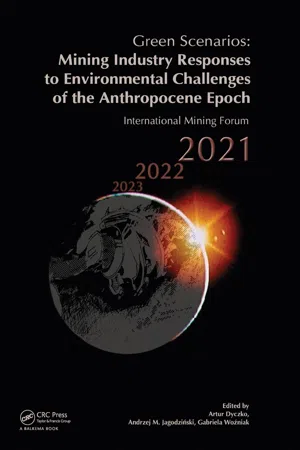
Green Scenarios: Mining Industry Responses to Environmental Challenges of the Anthropocene Epoch
International Mining Forum 2021
- 374 pages
- English
- ePUB (mobile friendly)
- Available on iOS & Android
Green Scenarios: Mining Industry Responses to Environmental Challenges of the Anthropocene Epoch
International Mining Forum 2021
About This Book
This book aims to present an alternative based on natural processes and an environmental approach to post-excavation site management, e.g., post-coal mining heaps. These sites are places where various mineral excavation by-products are collected. Nevertheless, some post-mineral excavation sites are oligotrophic, terrestrial, wetland, and water habitat islands, providing unique biodiversity enrichment in the landscape. These oligotrophic mineral habitats are essential in over-fertilized, eutrophic, agricultural and urban-industry surroundings. Some post-mineral excavation sites are places where the wildlife can develop and support the functional processes of novel ecosystems. Implementing the newest biogeochemical and comprehensive knowledge into urban-industry landscape management will help to establish the ecosystem's processes and environmental functioning.
There are several post-industrial sites in Europe where the wildlife areas developed due to natural processes, are becoming wildlife hotspots in densely populated urban-industry areas. In this respect, many of the oligotrophic mineral terrestrial, wetland, and water habitats of anthropogenic origin should not be categorized as environmentally dangerous and undergo economic utility-focused reclamation.
Facing the actual environmental constraints of the Anthropocene Epoch, the book's chapters presenting the natural basics and perquisites of the environmental ecosystem mosaics, will be interesting for a broad range of environmentalists (scientists and students), miners, economists, and sociologists.
Frequently asked questions
Information
Table of contents
- Cover
- Half Title
- Title
- Copyright Page
- Table of Contents
- Preface
- Part One: Geological Background of the Mineral Resources Exploitation
- Part Two: Novel Ecosystems – the Image of Anthropocene Epoch Environmental Conditions
- Part Three: Modern Methods Approach to Novel Ecosystem Studies
- Part Four: Natural Capital as the Basis for Ecosystem Services
- Part Five: Educational and Social Aspects of Post-mineral Exploitation Habitats
- Author Index